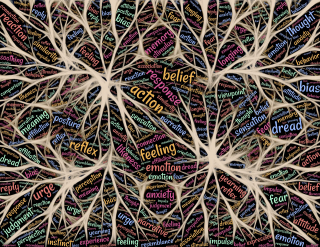Rob Bignell's Blog, page 238
September 19, 2017
5 Writing Prompts For Science Fiction
Science fiction  stories typically revolve arise from a novum, a scientifically plausible concept that is a ���reality��� in the tale. The novum might be an mechanical device like robot servants, artificial intelligence, or faster-than-light spacecraft; it also can be a hypothetical idea such as ���The Earth is a scientific experiment run by aliens to determine the meaning of life��� or ���The government outlaws books.��� The author then asks ���What if?��� exploring how the world with this novum is different than ours.
stories typically revolve arise from a novum, a scientifically plausible concept that is a ���reality��� in the tale. The novum might be an mechanical device like robot servants, artificial intelligence, or faster-than-light spacecraft; it also can be a hypothetical idea such as ���The Earth is a scientific experiment run by aliens to determine the meaning of life��� or ���The government outlaws books.��� The author then asks ���What if?��� exploring how the world with this novum is different than ours.
Among the problems of many novice science fiction writers is instead of introducing a new novum they rely on used furniture ��� that is, they borrow novums from popular SF series. After all, how many novels have you read that use starships exploring the galaxy for the Earth-based Federation? Barely changing names to appear as if you are not appropriating ��� a starcraft seeking M-class worlds for the Earth-centered Alliance ��� still doesn���t cut it as original or fully using the potential that science fiction offers to examine our culture or humanity.
To help SF writers, here are some novums of potential near-future inventions from which stories could be built:
Ice Age Park
What if scientists were able to create hybrids of extinct animals and plants from the Pleistocene, such as wooly mammoths and saber-tooth tigers, that people could visit like they do zoos today? What would such a park have to do to remain financially solvent?
Portable medical test
What if a device could test a person���s blood, saliva or urine to determine conditions ranging from malaria and typhoid to anemia and diabetes? It could be powered or hooked to the Internet by plugging into a cell phone.
Skyscraper farms
What if food were grown in vertically stacked levels, over bodies of water near cities? Feeding on liquid nutrients, a 106-story high farm that is 200-yards wide would produce more than 8 tons of vegetables and 1.5 tons of fish per year.
Skystations
What if instead of boarding a plane at an airport you boarded a pod-like train, carrying your luggage with you, that a descending airplane would pickup and bring to another airport. There, the airplane would drop off your pod, which would head to a specific section of the city closest to your destination? The airplanes never would land except for maintenance), reducing fuel needs and the time an aircraft needed at an airport.
Virtual reality news
What if you could experience the news as the reporter does via virtual reality? You could had through a battlefield with embedded reporters, walk across a refugee camp, or live through a hurricane, all from the comfort of your own home. Would this change the way people perceive the world and others?
Professional Book Editor: Having your novel, short story or nonfiction manuscript proofread or edited before submitting it can prove invaluable. In an economic climate where you face heavy competition, your writing needs a second eye to give you the edge. I can provide that second eye.
<A HREF="http://ws-na.amazon-adsystem.com/widg... Widgets</A>
Related articles
 Five Great Quotations about the Writing Process
Five Great Quotations about the Writing Process Writing Inspiration: Seek another's advice
Writing Inspiration: Seek another's advice Make tables readable in your self-published book
Make tables readable in your self-published book 5 Great Sci-Fi Writing Prompts - Inventing Reality Editing Service
5 Great Sci-Fi Writing Prompts - Inventing Reality Editing Service 5 Great Sci-fi Story Ideas
5 Great Sci-fi Story Ideas
September 18, 2017
Hint at protagonist's intentions on opening page
The opening  page of your story always should include your protagonist���s intentions, meaning the step he plans to take to deal with the story���s main problem.
page of your story always should include your protagonist���s intentions, meaning the step he plans to take to deal with the story���s main problem.
Suppose the problem of our story is that a character possessing some special gift must avoid capture by a nefarious person seeking to control and use her powers for his own gain. Our protagonist is assigned to protect the character with the gift. His intention would be his initial plan to protect her from the antagonist���s anticipated first move. From there, the story moves into the rising action as the reader will be shown how the protagonist may or may not succeed.
The intention given on the first page ��� and those given throughout the rest of the story, for that matter ��� should arise from the protagonist���s internal motivations. Suppose, for example, that our protagonist from the last paragraph prides himself for being meticulous in his planning, as it has led to his success and respect from his peers, all of which feed his sense of self-worth. His internal motivation then his to perform his duty in a way that leads to him continuing to maintain his self-worth. Because of this, his intention could be to ensure he has planned to perfectly counter both a frontal attack and an ambush, as he ferries the gifted character to a place of hiding.
This intention also must always conflict with resolving the story���s central problem. Suppose that the gifted person being ferried is not one who much likes being told what to do. The result is that this person does something during an ambush that goes against our protagonist���s plans and so she goes missing. In short, the protagonist���s planning was for naught because his fatal flaw was the assumption that everyone with him would follow the plan. While the failing of the intention won���t appear on the first page, as a writer you must be aware of how the intention established in the opening paragraphs will play out in the pages ahead.
Without an established intention, your protagonist will wander aimlessly into the first scene of the rising action. At the very least, your story will be underwhelming. Suppose you established no intention in the aforementioned gift story. What would happen during as the rising action begins? Would they just march along toward their destination? If there is attack, because the intention doesn���t come into conflict with solving the story���s central problem, the protagonist���s planning would result in the ambush being repelled. That���s nothing more than a fight scene. Either way, the story���s suspense and tension doesn���t increase into the next scene.
Ideally, the protagonist���s intention, as it conflicts with solving the story���s central problem, will result in him questioning his own internal motivations by story���s end. While this isn���t something that is written on the story���s first page, it is something that the author, as penning the opening paragraphs, should think through. In the case of our protagonist, he should come to wonder if he is too rigid in his approach to his mission and to life itself. Perhaps to succeed he must decide to be flexible���and perhaps to maintain his self-worth he must feed it in ways other than his peers��� praise.
Professional Book Editor: Having your novel, short story or nonfiction manuscript proofread or edited before submitting it can prove invaluable. In an economic climate where you face heavy competition, your writing needs a second eye to give you the edge. I can provide that second eye.
<A HREF="http://ws-na.amazon-adsystem.com/widg... Widgets</A>
Related articles
 Five Great Quotations about the Writing Process
Five Great Quotations about the Writing Process Four writing prompts: Doubt
Four writing prompts: Doubt Four writing prompts: Memory - Inventing Reality Editing Service
Four writing prompts: Memory - Inventing Reality Editing Service Four Great Writing Prompts: Fear - Inventing Reality Editing Service
Four Great Writing Prompts: Fear - Inventing Reality Editing Service Four writing prompts: Innocence lost - Inventing Reality Editing Service
Four writing prompts: Innocence lost - Inventing Reality Editing Service
September 17, 2017
Five Great Quotations about Revising
���Writing  is like digging yourself out of a pile of crap but then the pile covers you again and you have to write your way out of it again.��� - Charles Bukowski
is like digging yourself out of a pile of crap but then the pile covers you again and you have to write your way out of it again.��� - Charles Bukowski
���The first draft reveals the art; revision reveals the artist.��� ���Michael Lee
���You never have to change anything you got up in the middle of the night to write.��� - Saul Bellow
���Rewrite in process is usually found to be an excuse for not going on.��� - John Steinbeck
���I suppress in my prose any language which calls attention to itself.��� - Jerzy Kosinski
Professional Book Editor: Having your novel, short story or nonfiction manuscript proofread or edited before submitting it can prove invaluable. In an economic climate where you face heavy competition, your writing needs a second eye to give you the edge. I can provide that second eye.
<A HREF="http://ws-na.amazon-adsystem.com/widg... Widgets</A>
Related articles
 Five Great Quotations about the Writing Process
Five Great Quotations about the Writing Process Writing Inspiration: Seek another's advice
Writing Inspiration: Seek another's advice Make tables readable in your self-published book
Make tables readable in your self-published book
September 16, 2017
To write, I quash the perfectionist impulse
Writers who  are perfectionists usually procrastinate, waiting for inspiration to magically strike so they can create the perfect work. Unfortunately nothing ever gets written, or at least finished, because they���re rarely in that inspired state to create a perfect manuscript, let alone a perfect paragraph or sentence.
are perfectionists usually procrastinate, waiting for inspiration to magically strike so they can create the perfect work. Unfortunately nothing ever gets written, or at least finished, because they���re rarely in that inspired state to create a perfect manuscript, let alone a perfect paragraph or sentence.
Unfortunately, telling an author that to merely be close to perfect they need to write and not worry about the quality, as that will come the more one writes, usually fails to get the perfectionist into a chair writing away. That���s because perfectionism arises from an overpowering set of unrealistic aspirations that trump logic.
If your goal is unrealistic, you almost always will suffer from anxiety that leaves you worried and hopeless. Imagine if you decided to climb Mount Everest but never trained for mountain hiking. Once you were dropped at the mountain���s base and told to get started, you���d freeze at the insurmountable task ahead of you. Aspiring perfectionist writers often face this same fear when they sit down to write a novel. All of that empty white paper before them might as well be a snow-packed trail that stretches into infinity.
The best friend of unrealistic goals is an overcritical inner voice that tells you the dream can���t be achieved. This voice isn���t satisfied telling you that safety is the best part of valor as you stand at Mt. Everest���s base; instead, it says, ���What were you even thinking? You���re so stupid for having this dream. You���ll never be able to reach the top; whatever made you entertain the notion that you could?��� Because of this inner voice, perfectionists almost always falls short of their own unrealistic standards. They either achieve something great or consider themselves worthless.
You can be a successful writer, but first you must learn to silence your inner critic. Begin with a journal entry listing all of the things you like about yourself. These can be positive traits that characters espouse in the stories you���ll pen.
You must recognize those ���all or nothing��� thoughts and instead tell yourself that you can be appreciated and respected for the ���small��� things you do. Start by writing a single beautiful sentence. Then pen a beautiful paragraph. That amount is not only good enough, it���s more than most people ever will write. And it���s cumulative. Today���s 30 pages of a written novel is the page you write every day for the past month all put together.
You must find others who encourage you to write and are less concerned with quality than the pleasure and beauty all writing brings, even if it only be by reading their blogs. While only you can turn off your inner critic, being around others who���ve mastered theirs will rub off.
You must abandon all negative and critical thoughts of others. For example, when reading a book, look for the beauty in it, not the failings. Nothing is perfect, but we do not have to emphasize the imperfections. Stop doing it with others, and may stop doing it to yourself.
While you may never be able to entirely vanquish your inner critic (and I���m not sure that you would want to), you can turn down his volume and hear less frequently from him. The small steps you take to do this will lead to a sentence, then a paragraph, then pages of writing, until at last you���re looking down from the mountain top with a finished book in hand.
Professional Book Editor: Having your novel, short story or nonfiction manuscript proofread or edited before submitting it can prove invaluable. In an economic climate where you face heavy competition, your writing needs a second eye to give you the edge. I can provide that second eye.
<A HREF="http://ws-na.amazon-adsystem.com/widg... Widgets</A>
Related articles
 Five Great Quotations about the Writing Process
Five Great Quotations about the Writing Process Writing Inspiration: Seek another's advice
Writing Inspiration: Seek another's advice Make tables readable in your self-published book
Make tables readable in your self-published book
September 15, 2017
How to improve your web text���s readability
Every word  counts when you write text for the web. The moment readers have difficulty following you or are no longer engaged is the moment they click to another website. Because of this, you must focus on achieving readability and the right tone.
counts when you write text for the web. The moment readers have difficulty following you or are no longer engaged is the moment they click to another website. Because of this, you must focus on achieving readability and the right tone.
Readability is how easily visitors to your page can understand what you���ve written. Tone is the author���s attitude toward a subject, and we���ll focus on that in a separate blog entry.
Unfortunately, readability can be a moving target. Each visitor to your website reads at a different level while bringing unique experiences, personalities and expectations. So we can only talk in generalities here.
Optimum readability is writing at an eighth grade reading level, according to various studies. If your audience is well-educated (master���s and doctorate���s degrees) and your subject matter more serious than usual (say science, philosophy, or literary analysis), then you can aim for a 12th grade reading level. That doesn���t mean you write as if your reader is 13 or 18 years old, as doing so requires age-specific considerations about maturity and development levels. You would, however, use vocabulary and sentence structures that a typical person of that age could easily read.
To strike the right level and readability for a general audience ��� 8th grade reading level ��� follow these four basic standards.
Sound conversational
You want to be plainspoken. That means no jargon, no acronyms, and probably no prosaic passages. If you have to use jargon or insider words, then you could include their definition in parentheses. You���ll also want to use short sentences, as long sentences can strain the reader���s memory. A lot of subordinate clauses and conjunctions simply make a sentence difficult to follow. As a side note, shorter sentences offer the advantage of making your writing sound more authoritative; readers often infer a lot of hedging in long sentences.
Hence, rather than write���
Generally, thru-hikers on the PCT can use one of two types of hiking backpacks ��� frameless and pack frame, the latter of which can be divided into two kinds, external and internal ��� as they hit the verdant mountain trails weaving beneath a brilliant turquoise heaven. (19th grade reading level)
���instead write���
Generally, Pacific Crest Trail hikers can use either a frameless or pack frame backpack. Pack frames in turn come in two types, external and internal. (9th grade reading level)
Use active voice
Avoid passive voice, which uses is, am, are, was, were, be or being as your sentence���s main verb. In contrast, active voice makes your sentences sound less bureaucratic and formal. Indeed, passive voice unnecessarily lengthens your sentence. So, instead of writing This study was conducted on 168 young pigs in an authentic farm environment over a 26-week period by researchers from America and Australia, go with America and Australian researchers studied 168 young pigs in an authentic farm environment over 26 weeks.
Use memorable phrases
The more you can compress complex points into simple maxims, the better. Readers are more likely to remember short, pithy statements than your point-by-point, detailed explanation of a concept. So don���t write To act civilized out in the wilds, as a hiker always minimize damage to your surroundings but instead Leave no trace.
Don���t wander
Your writing needs to stay on point. That means no rambling or telling long stories. Always remember that the visitor wants to quickly learn you main points not go in-depth or study side issues. If the above ���Sound conversational��� point had included as 12-sentence anecdote about the time I wrote a really long, rambling sentence and got a bunch of emails asking me what I meant, then I���d have wandered. Cut that kind of writing from your web text.
Getting your text to be more readable can be a challenge at first, but it���s really just a matter of identifying these four issues. Always edit your piece looking for such problems. You then can run your article through any of a number of free online readability apps and continue to revise if necessary. In fact, this article started at a 13th grade readability and after a revision is down to 10th grade readability.
Professional Book Editor: Having your novel, short story or nonfiction manuscript proofread or edited before submitting it can prove invaluable. In an economic climate where you face heavy competition, your writing needs a second eye to give you the edge. I can provide that second eye.
&lt;A HREF=���http://ws-na.amazon-adsystem.com/widg... Widgets&lt;/A&gt;
Related articles
 Five Great Quotations about the Writing Process
Five Great Quotations about the Writing Process Writing Inspiration: Seek another's advice
Writing Inspiration: Seek another's advice Make tables readable in your self-published book
Make tables readable in your self-published book
September 14, 2017
Indie Authors: 3 Tips on Distributing Ebooks

��� Common questions about publishing ebooks
��� Distribute ebook on variety of ereaders, tablets
��� Pros and cons of using Smashwords for ebooks
Professional Book Editor: Having your novel, short story or nonfiction manuscript proofread or edited before submitting it can prove invaluable. In an economic climate where you face heavy competition, your writing needs a second eye to give you the edge. I can provide that second eye.
&lt;A HREF="http://ws-na.amazon-adsystem.com/widg... Widgets&lt;/A&gt;
Related articles
 Five Great Quotations about the Writing Process
Five Great Quotations about the Writing Process Writing Inspiration: Seek another's advice
Writing Inspiration: Seek another's advice Make tables readable in your self-published book
Make tables readable in your self-published book
September 13, 2017
How to use page numbers in APA Style Citations
When writing  an academic paper, you���ll undoubtedly have to provide in-text citations, which credit the information���s source. This shows you are not plagiarizing and allows readers interested in the cited research to more easily locate it for their own follow-up reading.
an academic paper, you���ll undoubtedly have to provide in-text citations, which credit the information���s source. This shows you are not plagiarizing and allows readers interested in the cited research to more easily locate it for their own follow-up reading.
If writing your paper in APA style, there are specific rules for listing citations. How to provide page numbers in those citations often proves confusing, probably because they are done differently than in MLA and Kate Turabian.
Following are the APA styles for page numbers.
One page number
If a direct quotation or a paraphrase appears on a single page, the use the abbreviation p. (for page) and list the page number. Always place this in parentheses.
���Writing is creation. Through writing, we can understand what being human means. We can understand our own self���We can bring laughter and tears and deep introspection to our readers. We can store and share knowledge so others may lead better lives��� (Bignell, 2014, p. 34).
Bignell (2014) states that ���Writing is creation��� (p. 34).
A love of words is a key trait of all serious writers (Bignell, 2014, p. 6).
Bignell (2014) claims that a love of words is a key trait of all serious writers (p. 6).
Two or more page numbers
If a direct quotation or paraphrase starts on one page then continue to another, use the abbreviation pp. (for pages) and list both the first and the last page numbers that the reference appears.
���When an idea for your story comes to you, write it down. Don���t limit yourself to that day���s story idea; write down any ideas for any story that come to you��� (Bignell, 2014, pp. 7-8).
Bignell (2014) advises, ���When an idea for your story comes to you, write it down. Don���t limit yourself to that day���s story idea; write down any ideas for any story that come to you��� (pp. 7-8).
Carry a notepad wherever you go, so you can write down story ideas when they pop into your head (Bignell, 2014, pp. 7-8).
Bignell (2014) recommends carrying a notepad wherever you go, so you can write down story ideas when they pop into your head (pp. 7-8).
No page number
In the rare case where no page numbers occur, use the paragraph number. If a paragraph number isn���t provided in the cited source���s margin, you���ll have to count the number of paragraphs starting at the last header. Use the abbreviation para. (for paragraph) and place it in parentheses.
Books ���became my companions��� (Bignell, 2014, para 1).
Bignell (2014, para. 1) wrote that books ���became my companions.���
Professional Book Editor: Having your novel, short story or nonfiction manuscript proofread or edited before submitting it can prove invaluable. In an economic climate where you face heavy competition, your writing needs a second eye to give you the edge. I can provide that second eye.
&amp;lt;a href="http://ws-na.amazon-adsystem.com/widg... Widgets&amp;lt;/a&amp;gt;
Related articles
 Five Great Quotations about the Writing Process
Five Great Quotations about the Writing Process How many words is a novella? - Inventing Reality Editing Service
How many words is a novella? - Inventing Reality Editing Service Editing tip: Use parentheses and keep going - Inventing Reality Editing Service
Editing tip: Use parentheses and keep going - Inventing Reality Editing Service Writing prompt: Coming up with an opening line - Inventing Reality Editing Service
Writing prompt: Coming up with an opening line - Inventing Reality Editing Service Writing Prompt: Practice being present - Inventing Reality Editing Service
Writing Prompt: Practice being present - Inventing Reality Editing Service
September 12, 2017
5 Great Sci-fi Story Ideas
Science fiction  stories typically revolve around a novum, a scientifically plausible concept that is a ���reality��� in the tale. The novum might be an mechanical device like robot servants, artificial intelligence, or faster-than-light spacecraft; it also can be a hypothetical idea such as ���The Earth is a scientific experiment run by aliens to determine the meaning of life��� or ���The government outlaws books.��� The author then asks ���What if?��� exploring how the world with this novum is different than ours.
stories typically revolve around a novum, a scientifically plausible concept that is a ���reality��� in the tale. The novum might be an mechanical device like robot servants, artificial intelligence, or faster-than-light spacecraft; it also can be a hypothetical idea such as ���The Earth is a scientific experiment run by aliens to determine the meaning of life��� or ���The government outlaws books.��� The author then asks ���What if?��� exploring how the world with this novum is different than ours.
Among the problems of many novice science fiction writers is instead of introducing a new novum they rely on used furniture ��� that is, they borrow novums from popular SF series. After all, how many novels have you read that use starships exploring the galaxy for the Earth-based Federation? Barely changing names to appear as if you are not appropriating ��� a starcraft seeking M-class worlds for the Earth-centered Alliance ��� still doesn���t cut it as original or fully using the potential that science fiction offers to examine our culture or humanity.
To help SF writers, here are some novums of potential near-future inventions from which stories could be built:
Brainwave passwords
What if the only the way people could access their personal or company computers was by having their brainwaves read? Would this increase security or hamper the ability to access information?
Perpetual battery
What if someone finally figured out how to make a cheap, long-lasting, powerful battery that also was rechargeable after it lost power in a few years? Though this sounds merely convenient, in what ways would it actually help save the planet?
Robot nurses
What if C3P0-like nurses served in nursing homes or hospitals, helping patients move between rooms, delivering medications, keeping tabs on those who wander, taking vitals, even entertaining. Can emotional connections with these robots occur?
Sleep in a pill
Only a few neurones in the brain are responsible for sleep. What if you could take a pill that activated those neurons and that could halt their work so you would wake up at a specific time? How would this change the way we approached sleep and planning our daily activities? What if some overdosed on the pills while others chose to modify them so that they didn���t sleep for days?
Smart labels
What if every container of food, every battery casing, and every tire included a strip that monitored and revealed when it was spoiled, out of power, or too worn to be safely used? How would this alter the way people lived their daily lives?
Professional Book Editor: Having your novel, short story or nonfiction manuscript proofread or edited before submitting it can prove invaluable. In an economic climate where you face heavy competition, your writing needs a second eye to give you the edge. I can provide that second eye.
&lt;A HREF="http://ws-na.amazon-adsystem.com/widg... Widgets&lt;/A&gt;
Related articles
 Five Great Quotations about the Writing Process
Five Great Quotations about the Writing Process Writing Inspiration: Seek another's advice
Writing Inspiration: Seek another's advice Make tables readable in your self-published book
Make tables readable in your self-published book 5 Science Fiction Writing Prompts - Inventing Reality Editing Service
5 Science Fiction Writing Prompts - Inventing Reality Editing Service
September 11, 2017
Hint at protagonist's internal motivations
Merely presenting  a protagonist who will solve the story���s main problem the isn���t enough. Instead, you need to give reasons why the protagonist would even want to do so.
a protagonist who will solve the story���s main problem the isn���t enough. Instead, you need to give reasons why the protagonist would even want to do so.
Usually authors offer external motivations��� it���s his job, he needs to save his loved one, lots of people will die. But authors also ought to deliver, or at least hint at, the protagonist���s internal motivations to get involved. This is done to increase suspense and tension because the protagonist then has more than a mundane reason for acting. After all, a detective would handle every one of his murder cases by the book, but when the victim is a testifying witness that put away a killer in one of the detective���s past cases, then it���s personal���especially when a second testifying witness shows up dead.
To determine a protagonist���s internal motivations, you���ll want to think about his needs, desires, goals, dreams and fears. In the example of the aforementioned detective, he probably gains some satisfaction in protecting others from becoming future victims. Perhaps this is because one day when he was in school, he failed to protect his kid brother from bullies and has vowed he���ll never let down his guard again.
Ideally, these desires should in some way conflict with another in such a way that he is hesitant to resolve the central problem without making a personal sacrifice. Our detective, for example, probably also has a great motivation to always solve his cases per police protocol; he has a reputation for doing so, and for his own sense of self-worth, he needs the awe and respect it brings from his colleagues. Because he solves cases going by the book, this need will clash with his new desire to break the rules to meet his internal need of protecting others from harm. This internal conflict heightens the tension even more, as the only solution to solving the murder spree is to sacrifice something close to him, specifically his need for his colleague���s respect.
These internal motivations ought to make your protagonist both heroic and vulnerable. His motivations should be noble and never nefarious. Such is the case with the detective���s desire to protect. (Self-worth derived from his colleague���s recognition is neutral on the heroic scale, if he remains humble in public about his success.) Motivations can be wrongheaded, however. Neither his desire for perfectionism nor for self-worth primarily derived from his colleague���s respect are sustainable, after all, and show a need for emotional growth. That need makes our detective vulnerable and creates the basis for a great story.
As these internal motivations play a key role in the tale, they ought to be hinted at on your story���s very first page. In my novel ���Windmill,��� the protagonist Peter Steinar���s internal motivation that drives his decisions is the need to emotionally connect with his father. Consider the following passage from the novel���s opening page:
Though dust spiraled in thick furrows off the gravel road then across the vast, barren fields, Peter Steinar hesitated climbing down the windmill. He instead left his father and brother standing below to watch the approaching burgundy-colored car as sunlight and wind burned the land raw in a river of heat.
���Here must be that news reporter now,��� said father, beckoning for him.
Peter rolled his eyes but began his descent. Upon reaching the ground, his father handed him a handkerchief. It did little good. Red granules of prairie loam whirled upon the wind like thick swarms of gnats, and the old man blinked slowly. Peter searched for a hint of anticipation in that vacant face, saw only a thick line drooping beneath zombie-like eyes and skin damp from the swelter.
Peter���s internal motivation is inferred in the passage���s last sentence. He hopes to see some excitement in his father but doesn���t. Though both physically are sweating, their eyes (the window to the soul) behave quite differently; Peter���s are alive, but his father���s is like the living dead. The don���t connect emotionally.
Finally, always reveal these internal motivations by showing the character's personality through his actions, thoughts and dialogue. Never tell them through exposition as was written in this explanation of internal motivations about the detective. Telling internal motivations rather than inferring (by showing) actually undercuts the level of suspense and tension they bring to the story.
Professional Book Editor: Having your novel, short story or nonfiction manuscript proofread or edited before submitting it can prove invaluable. In an economic climate where you face heavy competition, your writing needs a second eye to give you the edge. I can provide that second eye.
&amp;lt;A HREF="http://ws-na.amazon-adsystem.com/widg... Widgets&amp;lt;/A&amp;gt;
Related articles
 Five Great Quotations about the Writing Process
Five Great Quotations about the Writing Process Writing Inspiration: Seek another's advice
Writing Inspiration: Seek another's advice Make tables readable in your self-published book
Make tables readable in your self-published book Four writing prompts: Memory - Inventing Reality Editing Service
Four writing prompts: Memory - Inventing Reality Editing Service Four writing prompts: Race - Inventing Reality Editing Service
Four writing prompts: Race - Inventing Reality Editing Service
September 10, 2017
Five Great Quotations about Readers
���There  is only one thing that you write for yourself, and that is a shopping list.��� - Umberto Eco
is only one thing that you write for yourself, and that is a shopping list.��� - Umberto Eco
���...never assume you're the master, only the student. Your audience will determine if you're masterful.��� - Don Roff
���The writer does the most who gives his reader the most knowledge and takes from him the least time.��� - Charles Caleb Colton
���Reading...is a co-production between writer and reader.��� - Ben Okri
���Readers are what it's all about, aren't they? If not, why am I writing?��� - Evan Hunter
Professional Book Editor: Having your novel, short story or nonfiction manuscript proofread or edited before submitting it can prove invaluable. In an economic climate where you face heavy competition, your writing needs a second eye to give you the edge. I can provide that second eye.
&amp;lt;A HREF="http://ws-na.amazon-adsystem.com/widg... Widgets&amp;lt;/A&amp;gt;
Related articles
 Five Great Quotations about the Writing Process
Five Great Quotations about the Writing Process Writing Inspiration: Seek another's advice
Writing Inspiration: Seek another's advice Writing Inspiration: Who are you?
Writing Inspiration: Who are you? Make tables readable in your self-published book
Make tables readable in your self-published book Four ways to write a great tweet that sells books
Four ways to write a great tweet that sells books



